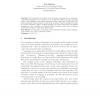Free Online Productivity Tools
i2Speak
i2Symbol
i2OCR
iTex2Img
iWeb2Print
iWeb2Shot
i2Type
iPdf2Split
iPdf2Merge
i2Bopomofo
i2Arabic
i2Style
i2Image
i2PDF
iLatex2Rtf
Sci2ools
109
click to vote
JUCS
2010
2010
Ordered Catenation Closures and Decompositions of Languages Related to a Language of Derick Wood
: We investigate the problem of decomposing a language into a catenation of nontrivial languages, none of which can be decomposed further. In many cases this leads to the operation of an ordered catenation closure, introduced in this paper. We study properties of this operation, as well as its iterations. Special emphasis is on laid on ordered catenation closures of finite languages. It is also shown that if an infinite language is a code or a length code, then its ordered catenation closure does not possess a finite decomposition of indecomposable factors. Key Words: decomposition of languages, indecomposable language, finite language, code, length code, ordered catenation closure
| Added | 29 Jan 2011 |
| Updated | 29 Jan 2011 |
| Type | Journal |
| Year | 2010 |
| Where | JUCS |
| Authors | Arto Salomaa |
Comments (0)

